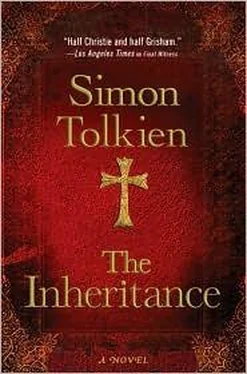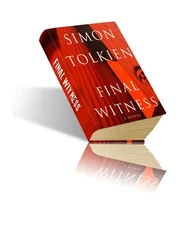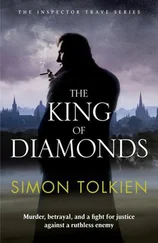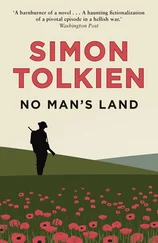Simon Tolkien - The Inheritance
Здесь есть возможность читать онлайн «Simon Tolkien - The Inheritance» — ознакомительный отрывок электронной книги совершенно бесплатно, а после прочтения отрывка купить полную версию. В некоторых случаях можно слушать аудио, скачать через торрент в формате fb2 и присутствует краткое содержание. Жанр: Полицейский детектив, на английском языке. Описание произведения, (предисловие) а так же отзывы посетителей доступны на портале библиотеки ЛибКат.
- Название:The Inheritance
- Автор:
- Жанр:
- Год:неизвестен
- ISBN:нет данных
- Рейтинг книги:4 / 5. Голосов: 1
-
Избранное:Добавить в избранное
- Отзывы:
-
Ваша оценка:
- 80
- 1
- 2
- 3
- 4
- 5
The Inheritance: краткое содержание, описание и аннотация
Предлагаем к чтению аннотацию, описание, краткое содержание или предисловие (зависит от того, что написал сам автор книги «The Inheritance»). Если вы не нашли необходимую информацию о книге — напишите в комментариях, мы постараемся отыскать её.
The Inheritance — читать онлайн ознакомительный отрывок
Ниже представлен текст книги, разбитый по страницам. Система сохранения места последней прочитанной страницы, позволяет с удобством читать онлайн бесплатно книгу «The Inheritance», без необходимости каждый раз заново искать на чём Вы остановились. Поставьте закладку, и сможете в любой момент перейти на страницу, на которой закончили чтение.
Интервал:
Закладка:
“And that made Stephen angry?”
“Yes. Angry and ashamed.”
“And what did it make you feel?”
“I don’t know. I felt bad, but I lived with it. Perhaps I don’t expect as much from people as my brother does.”
“I see,” said Swift. “Now, I want to ask you about a blackmail letter that your father received two years before his death. You and Stephen read this letter, did you not?”
“Yes. That was when the trouble between them started.”
“What did the letter say?”
“That the person had seen what my father did at this place called Mar-jean. He wanted the manuscript if he was going to stay quiet. My father was supposed to take it to him in London.”
“Did he?”
“No. My father never left the house. Sergeant Ritter went. He said he was going to deal with the man. There were no more letters after that, or at least none that I knew of,” said Silas, correcting himself.
“So Professor Cade and the sergeant seemed to know who had written the letter,” said the judge.
“Yes. They were certain it was someone called Carson, who’d been with them at this place-Marjean. My father said he was the one who shot him in France.”
“Carson,” said the judge repeating the name.
“Yes,” said Silas.
The judge made a note on a piece of paper and nodded to Swift to continue.
“You told the court earlier that your brother decided to seek a reconciliation with your father about a week before his death,” said Swift.
“Yes.”
“And that this decision was because of what you’d told your brother about your father’s intention to change his will.”
“Yes.”
“But that wasn’t Stephen’s only reason for going to Moreton, was it, Mr. Cade?”
Silas didn’t respond, and so Swift answered his own question.
“You said to your brother when you visited him that you’d overheard your father telling Sergeant Ritter that he didn’t have long to live. Isn’t that right, Mr. Cade?”
“I told Stephen a lot of things. That was just one of them.”
“But it upset him, didn’t it, to hear that his father was going to die?”
“He was upset by everything I told him,” said Silas. “Angry too.”
“Angry,” repeated Swift. “But that doesn’t mean that he said that he was going to harm your father.”
“No. We wanted to get our father to change his mind. About his will.”
“Did you ever see your brother with a gun?” asked Swift, changing tack.
“No. Not that I remember.”
“Are you sure? Didn’t Sergeant Ritter make you and Stephen fire his pistol in the garden once?”
“Yes,” said Silas after a moment. “I’m sorry, I forgot about that. We didn’t want to, but he made us.”
“He nailed a target to one of the oak trees, and you and Stephen took turns shooting at it.”
“Yes.”
“How did your brother do?”
“I don’t remember.”
“He missed every time, didn’t he, Mr. Cade? He didn’t even hit the target.”
“I told you. I don’t remember. I was concentrating on what I was doing.”
“And how did you do?”
“I was better than my brother, but that doesn’t make me a marksman,” said Silas, suddenly defensive.
“Thank you. No more questions,” said Swift, resuming his seat.
EIGHT
There was a table in the corner of Stephen’s unbelievably small cell deep inside Wandsworth Prison. It had no legs but instead opened out directly from the wall. Table legs could be used as a weapon, and the authorities were taking no chances. Stephen had arranged the few personal possessions that he had brought with him on the surface of this table, and in the centre was a framed photograph of Mary. It had been taken a few weeks after they first met, when the world had been an entirely different place and he’d been as happy as he’d ever been in all his life. She was standing on a bridge and the wind had blown up her brown hair into a whirl around her face. She was wearing a white cotton shirt and a linen skirt and she was laughing. Stephen remembered the moment. They had been walking across Port Meadow, and Mary’s straw hat suddenly blew away on the wind. Stephen had pursued it, jumping uselessly from tussock to tussock until it had sailed down into the water and been borne away on the current. And Mary had laughed almost until she cried, making her look impossibly pretty, with her lips parted to reveal her perfect white teeth, her dark eyes full of life. Stephen had got out his camera and taken a photograph. Then they had continued on past the boats and the swans and the swaying poplar trees to a high stile, and when he had put out his hand to help her over, she had kept hold of it as they walked up the path to the Perch. Stephen remembered that day so clearly. They had sat outside in the pub’s garden drinking low-quality white wine and he had told her all about his family: his dead mother and his soon-to-be-dead father and the terrible crime that Colonel John Cade had committed fourteen years earlier in a small French village called Marjean.
He had to tell someone, because the truth was that Stephen had never been able to get the place out of his head since that night when he and his brother had crouched below his father’s study window and heard the truth for the first time. God knows, he’d tried. From his first day at New College he’d thrown himself into student life. Politics was his passion-changing the world; and the river winding under the willow trees, the quiet quadrangles, and the college chapel with Epstein’s statue of Lazarus, who turned in white burial clothes while rising from the dead, were all invisible to him as he hurried through the medieval streets to some meeting of bearded socialists in the back of a crowded pub or rushed off to London to march against the bomb. Then, suddenly, he was at the end of the first year and the exams were upon him. He stayed up all night for a week and just scraped through. And in the summer he worked picking fruit for a month before he took off and traveled through Europe, eating almost nothing so that he’d have enough money for the train fares. He went through France and northern Italy and even a bit of Switzerland before he realised where he was really going and wound up outside the ruins of Marjean Chateau on a hot afternoon in late August. The sunlight glistened on the glassy dark blue surface of the lake, and blackbirds flew in and out of the empty paneless windows of the gutted house, and at the top of the hill the church was locked with a rusty padlock. Stephen had never experienced such emptiness. The people who had lived here and loved this place were all dead, and there was nothing he could do to redeem what had happened to them. He had nothing to offer, no solution to the terrible silence, and so, after only a few minutes, he turned tail and walked quickly back up the overgrown drive, ignoring the thorny branches that snapped back on him as he passed, cutting his bare arms and face. On the main road he thumbed down a passing truck and hitched a ride all the way to Rouen.
Afterward he couldn’t get the place out of his head. He cursed his own curiosity, wished he hadn’t gone to Marjean. He was drinking more than a bottle of wine every day when he went to the Playhouse one afternoon early in the new year at the suggestion of his friend, Harry Brooks, and met a young actress called Mary Martin for the first time.
Except that it wasn’t the first time. He was sure of that now. She’d been sitting on one of the stone seats in the college’s medieval cloister about a week before when he came round the corner one evening, burdened with two heavy bags of pamphlets that his action group had had printed at the University Press.
Half the cloister was dark even on sunny days, since two of its four sides were in the shadow of a great oak tree growing in one of the corners, and it was long past sunset when he saw her. In fact, the only light came from the moon hanging overhead, and Stephen could hardly make out the woman’s features, although he stopped when he came upon her and dropped his bags on the ground, arrested by her unexpected presence, almost jumping to the conclusion that she was a ghost, the spurned wife or mistress of some long-dead professor. But then he’d remembered that he didn’t believe in ghosts and been about to apologise when the woman got up and walked away. They hadn’t exchanged a word, but still, looking back now, almost a year later, he was certain it was Mary whom he’d seen in the cloister.
Читать дальшеИнтервал:
Закладка:
Похожие книги на «The Inheritance»
Представляем Вашему вниманию похожие книги на «The Inheritance» списком для выбора. Мы отобрали схожую по названию и смыслу литературу в надежде предоставить читателям больше вариантов отыскать новые, интересные, ещё непрочитанные произведения.
Обсуждение, отзывы о книге «The Inheritance» и просто собственные мнения читателей. Оставьте ваши комментарии, напишите, что Вы думаете о произведении, его смысле или главных героях. Укажите что конкретно понравилось, а что нет, и почему Вы так считаете.












